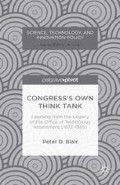Abstract
Today it is becoming increasingly more difficult for anyone or even any organization to keep pace with the frontiers of science and technology. Consequently it is becoming even more challenging for Congress to receive useful, relevant, informed, independent, authoritative and timely advice on the science and technology policy dimensions of the issues it faces, but the need is becoming a more frequent plea from the science and technology policy community. Effective science and technology policy advice in the unique policy making environment of the Congress today is perhaps especially complex and the necessary advice is generally not the same as that produced by most other organizations. Creating OTA-like features in existing organizations that would replicate the OTA study process and operate under direct congressional oversight is likely problematic, albeit still possible, in existing congressional organizations such as GAO or CRS, but OTA-like features may also be possible in external organizations such as the NRC, or in reinstating and updating an OTA to current circumstances.
Access this chapter
Tax calculation will be finalised at checkout
Purchases are for personal use only
Preview
Unable to display preview. Download preview PDF.
Notes
“Letter from James Madison to W. T. Barry, August 4, 1822” in Gaillard Hunt (ed.), The Writings of James Madison, 9 vols. New York: G. P. Putnam’s Sons, 1900–1910, Vol. 9, pp. 103–109.
See Charles F. Manski, Public Policy in an Uncertain World. Cambridge, MA: Harvard University Press, 2013,
M. Granger Morgan, Max Henrion, Mitchell Small. Uncertainty: A Guide to Dealing with Uncertainty in Quantitative Risk and Policy Analysis. London: Cambridge University Press, 1990, or
Duncan Jr. MacRae and Dale Whittington, Expert Advice for Policy Choice. Washington, DC: Georgetown University Press, 1997.
See, for example, Sheila Jasanoff, The Fifth Branch. Cambridge, MA: Harvard University Press, 1990., Chapters 10–11.
L. R. Bruce Smith, The Advisers: Scientists in the Policy Process. Washington, DC: The Brookings Institution, 1992, p. 202.
See, as a sequential sampling related to science and technology advice, beginning perhaps with seminal Vannevar Bush report, Science, The Endless Frontier, A Report to the President on a Program for Postwar Scientific Research. Washington, DC: Office of Scientific Research and Development, July 5, 1945) and his subsequent reflection in Vannevar Bush, Science is Not Enough. New York: William Morrow & Co., Inc., 1965 and, going forward,
Spencer Klaw, The New Brahmins: Scientifc Life in America. New York: William Morrow & Co., Inc., 1968,
Paul J. Piccard (ed.) Science and Policy Issues: Lectures in Government and Science. Itasca, IL: EE. Peacock Publishers, Inc., 1969,
Joseph Ben-David, The Scientist’s Role in Society. Englewood Cliffs, NJ: Prentice-Hall, Inc., 1971, Smith (1992), Jasanof (1990),
David M Hart, Forged Consensus: Science, Technology, and Economic Policy in the United States, 1921–1953. Princeton, NJ: Princeton University Press, 1998, and
David C. Mowery and Nathan Rosenberg. “U.S. National Innovation System” in Richard R. Nelson (ed.), National Innovation Systems: A Comparative Analysis. New York: Oxford University Press, 1993, and Sigma Xi,
The Scientific Research Society. Vannevar Bush II: Science for the 21st Century, Forum Proceedings, March 2–3, 1995. Research Triangle Park, NC: Sigma Xi, 1995.
Such as Granger M. Morgan and John M. Peha (eds) Science and Technology Advice for Congress, Washington, DC: RFF Press, 2003 and
Justus Lentsch and Peter Weingart (eds) Between Science and Politics—Quality Control in the Advisory Process, London: Cambridge University Press, 2011.
Charles E. Lindblom, The Policy Making Process. Englewood Cliffs, NJ: Prentice Hall, Inc., 1968, pp. 77–78.
Carroll W. Pursell, Jr., “Science and Government Agencies,” in David D. Van Tassel and Michael G. Hall (eds), Science and Society in the United States. Homewood, IL: The Dorsey Press, 1966, p. 249.
Thomas Jefferson, “Letter to Samuel Kercheval,” July 12, 1816, in Paul L. Ford (ed.), The Writings of Thomas Jefferson, Vol. 10, New York: G.P. Putnam, 1904, p. 4243.
Copyright information
© 2013 Peter D. Blair
About this chapter
Cite this chapter
Blair, P.D. (2013). Conclusions. In: Congress’s Own Think Tank: Learning from the Legacy of the Office of Technology Assessment (1972–1995). Science, Technology, and Innovation Policy. Palgrave Pivot, New York. https://doi.org/10.1057/9781137359056_10
Download citation
DOI: https://doi.org/10.1057/9781137359056_10
Publisher Name: Palgrave Pivot, New York
Print ISBN: 978-1-349-47208-6
Online ISBN: 978-1-137-35905-6
eBook Packages: Palgrave Economics & Finance CollectionEconomics and Finance (R0)

